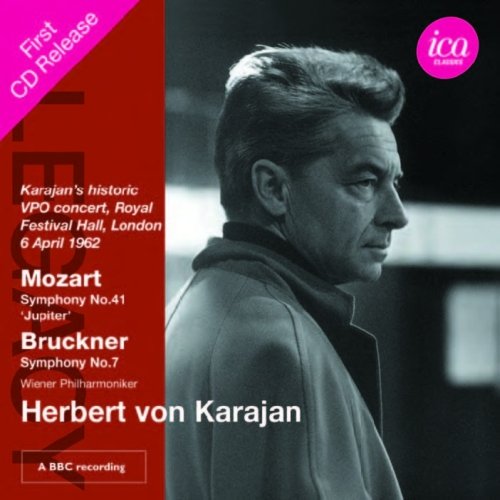BRUCKNER Symphony No 7
Two Bruckner Sevenths including Thielemann’s Dresden inauguration
View record and artist detailsRecord and Artist Details
Composer or Director: Hugo (Filipp Jakob) Wolf
Genre:
DVD
Label: Opus Arte
Magazine Review Date: 09/2013
Media Format: Digital Versatile Disc
Media Runtime: 106
Mastering:
DDD
Catalogue Number: OA1115D

Tracks:
| Composition | Artist Credit |
|---|---|
| Mörike Lieder, Movement: Verborgenheit |
Hugo (Filipp Jakob) Wolf, Composer
Christian Thielemann, Conductor Hugo (Filipp Jakob) Wolf, Composer Renée Fleming, Soprano Staatskapelle Dresden |
| (5) Lieder, Movement: No. 4, Befreit (wds. Dehmel: orch 1933) |
Richard Strauss, Composer
Christian Thielemann, Conductor Renée Fleming, Soprano Staatskapelle Dresden |
| Symphony No. 7 |
Anton Bruckner, Composer
Christian Thielemann, Conductor Staatskapelle Dresden |
| Mörike Lieder, Movement: Er ist's |
Hugo (Filipp Jakob) Wolf, Composer
Christian Thielemann, Conductor Hugo (Filipp Jakob) Wolf, Composer Renée Fleming, Soprano Staatskapelle Dresden |
| Mörike Lieder, Movement: Elfenlied |
Hugo (Filipp Jakob) Wolf, Composer
Christian Thielemann, Conductor Hugo (Filipp Jakob) Wolf, Composer Renée Fleming, Soprano Staatskapelle Dresden |
| Goethe Lieder, Movement: Anakreons Grab |
Hugo (Filipp Jakob) Wolf, Composer
Christian Thielemann, Conductor Hugo (Filipp Jakob) Wolf, Composer Renée Fleming, Soprano Staatskapelle Dresden |
| Goethe Lieder, Movement: Mignon II (Nur wer die Sehnsucht kennt) |
Hugo (Filipp Jakob) Wolf, Composer
Christian Thielemann, Conductor Hugo (Filipp Jakob) Wolf, Composer Renée Fleming, Soprano Staatskapelle Dresden |
Genre:
Orchestral
Label: ICA Classics
Magazine Review Date: 09/2013
Media Format: CD or Download
Media Runtime: 92
Mastering:
ADD
Catalogue Number: ICAC5102

Tracks:
| Composition | Artist Credit |
|---|---|
| Symphony No. 41, "Jupiter" |
Wolfgang Amadeus Mozart, Composer
Herbert von Karajan, Conductor Vienna Philharmonic Orchestra |
| Symphony No. 7 |
Anton Bruckner, Composer
Herbert von Karajan, Conductor Vienna Philharmonic Orchestra |
Author: Rob Cowan
And he certainly earned the adulatory applause. A sequence of Hugo Wolf songs (plus Strauss’s deeply moving ‘Befreit’) featuring Renée Fleming proves Thielemann to be the most sensitive and responsive of accompanists, anticipating or reflecting his soloist’s every phrase. Fleming is in glorious voice, especially in such masterpieces as Wolf’s ‘Anakreons Grab’ and ‘Mignon’, both orchestrated by Wolf himself, and both sung with total conviction.
One of the most memorable aspects of Thielemann’s Bruckner Seventh is the sense that every player is alert to what his or her neighbour is doing: for example, the solo flute and clarinets near the start of the finale, all three of whom lend a lift to the rhythm. Thielemann’s approach allows for maximum textural transparency, the Scherzo’s Trio being a good case in point, and he can broaden the line without allowing it to sag, as he does in the first movement’s coda and towards the very end of the work. Less idiosyncratic than Barenboim with the Berlin Staatskapelle (DG, 7/12) and less marmoreal than Karajan’s Berlin Philharmonic Bruckner from the Sixties through to the Eighties (DG), Thielemann favours a brand of flexibility that recalls, in approximate terms, both Jochum and Furtwängler, and his new orchestra does him proud.
As to Karajan’s 1962 Vienna Philharmonic Seventh from the Royal Festival Hall, the swiftest we have from him (as Richard Osborne observes in the booklet-note), the combination of keen forward momentum and that unmistakably matured VPO sound more approximates Furtwängler than any other Karajan Bruckner performance in circulation. The playing is simply superb: as with Thielemann’s Seventh, the Scherzo’s Trio proves a telling place to sample, as does the broad arch of the first movement’s coda and the same movement’s mighty closing pages. Both conductors opt for the Haas edition, which means an Adagio topped by cymbals and triangle, and although ICA’s respectable mono sound can’t compare with Opus Arte’s sophisticated digital production (with its surround-sound option), it’s good enough to focus a gripping performance. Even so, I’m tempted to nominate Karajan’s Jupiter Symphony from the same concert as the CD double-pack’s musical highlight, principally for the profound insights that Karajan brings to the Andante cantabile, its lunging basses and breathlessly chattering violins especially, and a finale that goes off like a rocket and holds the tension right up until the symphony’s triumphant conclusion. A little too much to resist, that – just about the best of Karajan’s Bruckner and the best of his Mozart, all on one double CD. Don’t hesitate.
Discover the world's largest classical music catalogue with Presto Music.

Gramophone Digital Club
- Digital Edition
- Digital Archive
- Reviews Database
- Full website access
From £8.75 / month
Subscribe
Gramophone Full Club
- Print Edition
- Digital Edition
- Digital Archive
- Reviews Database
- Full website access
From £11.00 / month
Subscribe
If you are a library, university or other organisation that would be interested in an institutional subscription to Gramophone please click here for further information.




